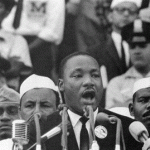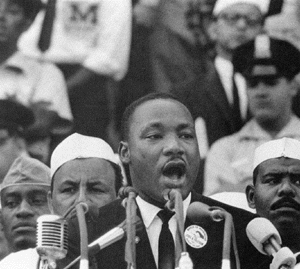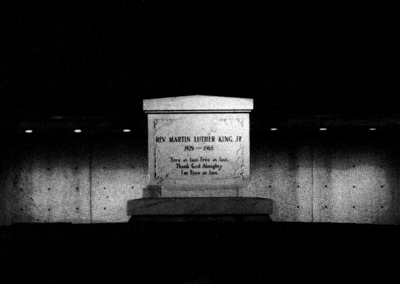 Martin Luther King Jr. was the most important voice of the American civil rights movement, which worked for equal rights for all. King was also a Baptist minister. He was assassinated in Memphis, Tennessee, when he was just 39 years old.
Martin Luther King Jr. was the most important voice of the American civil rights movement, which worked for equal rights for all. King was also a Baptist minister. He was assassinated in Memphis, Tennessee, when he was just 39 years old.
Martin Luther King, patron of civil rights

Martin Luther King
1929 – 1968
As the father of the modern civil rights movement, Dr. Martin Luther King, Jr., is recognised around the world as a symbol of freedom, peace, and non-violent civil disobedience.
He was born January 15, 1929, the son of an Atlanta pastor. His grandfather was a founder of the Atlanta chapter of the NAACP. Growing up, King began to see the church the way his father did – as a means for great social change for African-Americans.
Studies and Early Work
During his studies at Morehouse College, the school’s president (among others), encouraged King to do God’s work in society by becoming a minister. King graduated from Morehouse as a minister in 1948 and went on to Crozer Theological Seminary in Chester, Pennsylvania, where he earned a divinity degree. Continuing his education, King went on to earn a doctorate in theology from Boston University in 1955. It was during his time at Boston University that he decided to accept the pastorate of Montgomery, Alabama’s Dexter Avenue Baptist Church.
Just five days after the Rosa Parks refused to give her bus seat up to a white man, King was elected president of the Montgomery Improvement Association, which was formed by blacks who had decided to boycott Montgomery’s bus system. King underwent personal trials as the result of his new position. He was convicted of trying to interfere with bus company operations and his house was bombed. As a result of his unwavering dedication, King became known nationally as a courageous leader and as an outstanding speaker. Montgomery’s buses were desegregated after the Supreme Court declared Alabama’s segregation laws unconstitutional.
Noting their success in the bus boycott, King and other black ministers from the South wanted to build on the foundation they had just laid. They formed the Southern Christian Leadership Conference in 1957, with King as president. During 1957, King began to campaign for black voting rights, and he also published his first book, Stride Toward Freedom.
Gandhi and Non-violence
The following year saw King travelling to India, where he built upon his knowledge of Gandhi’s philosophy of non-violence. Subsequent peaceful protests led by Dr King showed the impact of Gandhi’s principle of sathyagraha, the non violent protest and the later mass demonstration imply understanding of Gandhi’s use of the Salt Marches to draw attention to a cause in a non-violent manner. King later resigned from the Dexter Avenue Baptist Church in 1959 and went back to Atlanta, where the headquarters for the Southern Christian Leadership Conference were located. Returning to Atlanta also allowed him to help his father in his pastoral duties.
A call from presidential candidate John F. Kennedy in 1960 to Coretta Scott King (King’s wife), solidified much black support for Kennedy’s successful campaign. The next year saw the launch of the student-driven Freedom Rides, which showed that the student movement had a mind of its own, and was not necessarily answerable to King.
Seeking to organise a protest campaign that would be successful and free from conflict with the student movement, King oversaw mass demonstrations in Birmingham, Alabama, where police were notoriously racist. The demonstrators often came up against police using fire hoses and police dogs, and the conflict that usually ensued made headlines around the globe.
Letter from Birmingham
In the spring of 1963, Martin Luther King, Jr. was hauled off to jail in the aftermath of the Birmingham confrontation with Public Safety Commissioner “Bull” Connor and municipal authorities. When King was criticised by a group of white clergymen who blamed him for precipitating the violence, he penned a subdued, but passionate letter of reply to his colleagues, smuggling it out on toilet tissue, the margins of newspapers, indeed any scrap of paper available to him.
In your statement you asserted that our actions, even though peaceful, must be condemned because they precipitate violence. Isn’t this like condemning the robbed man because his possession of money precipitated the evil act of robbery? Isn’t this like condemning Socrates because his unswerving commitment to truth and his philosophical delving precipitated the misguided popular mind to make him drink the hemlock? Isn’t this like condemning Jesus because his unique God-consciousness and never-ceasing devotion to God’s will precipitated the evil act of the Crucifixion?
The question is not whether we will be extremist but what kind of extremist will we be. Will we be extremists for hate or will we be extremists for love? Will we be extremists for the preservation of injustice-or will we be extremists for the cause of justice? In that dramatic scene on Calvary’s hill, three men were crucified for the same crime – the crime of extremism. Two were extremists for immorality, and thus fell below their environment. So, after all, maybe the South, the nation and the world are in dire need of creative extremists.
This led to President Kennedy’s commitment in July of 1963 to submit broad civil rights legislation to Congress (it eventually became the Civil Rights Act of 1964). A series of other mass protests climaxed in the infamous march on Washington, D.C., on August 28, 1963, which attracted a quarter of a million protesters. King addressed the throng from the steps of the Lincoln Memorial, giving his “I Have A Dream” speech.
“I Have a Dream”
I say to you today, my friends, that in spite of the difficulties and frustrations of the moment, I still have a dream. It is a dream deeply rooted in the American dream. I have a dream that one day this nation will rise up and live out the true meaning of its creed: “We hold these truths to be self-evident: that all men are created equal.” I have a dream that one day on the red hills of Georgia the sons of former slaves and the sons of former slave-owners will be able to sit down together at a table of brotherhood. I have a dream that one day even the state of Mississippi, a desert state, sweltering with the heat of injustice and oppression, will be transformed into an oasis of freedom and justice. I have a dream that my four children will one day live in a nation where they will not be judged by the color of their skin but by the content of their character.

King was subsequently named Man of the Year by Time magazine and received the Nobel Peace Prize in December of 1964. In his Nobel Peace Prize acceptance speech, Dr King likened the pursuit of peace and the elimination of racism to the pursuit of dharma [right conduct] and ahimsa [non-violence], eternal truths that empower the lives of anyone seeking a life of true humanness and right conduct.
Nobel Prize Acceptance Speech,
December 10, 1964,
Oslo, Norway:
… Civilization and violence are antithetical concepts. Negroes of the United States, following the people of India, have demonstrated that non-violence is not sterile passivity, but a powerful moral force which makes for social transformation. Sooner or later all the people of the world will have to discover a way to live together in peace, and thereby transform this pending cosmic elegy into a creative psalm of brotherhood. … I refuse to accept the idea that man is mere flotsam and jetsam in the river of life unable to influence the unfolding events which surround him. I refuse to accept the view that mankind is so tragically bound to the starless midnight of racism and war that the bright daybreak of peace and brotherhood can never become a reality.
Hardships and Troubles
Even though he was receiving many awards and honours and much recognition, his leadership was being challenged by the likes of Malcolm X, an advocate of black nationalism and Black Power proponent Stokely Carmichael. King and his staff were able to keep his opponents at bay long enough during 1965’s march from Selma to Montgomery, Ala., to achieve the Voting Rights Act of that year but later marches drew harsh criticism. Though many of the civil rights movement’s budding leaders did not share King’s views on non-violence, he remained committed to the philosophy. To propagate such a philosophy which brings about peace, freedom and social capital to one’s fellow man often brings difficulties and troubles to the life of the reformer. Here, Sathya Sai Baba of India speaks of happiness and sorrow, hardships and troubles:
Embodiments of Love!
The goal of man’s life is neither happiness nor sorrow. Man can find fulfilment in life only if he can trace the origin of happiness and sorrow. In fact, man attains wisdom from sorrow and not out of happiness. The sages and seers of yore had to face great hardships and troubles before they could set great ideals to the rest of the world. That is why their teachings have left an indelible impression on the hearts of the devotees of God. Both the individual and the society can achieve progress and prosperity only after undergoing many trials and tribulations. Man has to face not only difficulties, but censure and criticism also. But noble souls will never care for difficulties or criticism. Welfare of the society is their main objective in life. [Sathya Sai Baba, Easwaramma Day, 6 May 2000]
King was not only challenged from within the black community but also from without. FBI director J. Edgar Hoover consistently tried to undermine King’s leadership. These efforts became especially intense during 1967 when race riots were prevalent in urban areas and King criticised American involvement in Vietnam. His relations with the administration of President Lyndon Johnson were not good at that point, and he began to lose the support of many liberal whites. While helping out with a garbage-workers strike in Memphis, King was assassinated on April 4, 1968, outside his motel room.
The Final Address of Martin Luther King:
We need all of you. And you know what’s beautiful to me, is to see all of these ministers of the Gospel. It’s a marvellous picture. Who is it that is supposed to articulate the longings and aspirations of the people more than the preacher? Somehow the preacher must be an Amos, and say, “Let justice roll down like waters and righteousness like a mighty stream.” Somehow, the preacher must say with Jesus, “The spirit of the Lord is upon me, because he hath anointed me to deal with the problems of the poor.”
Sathya Sai Baba,
Hillview Stadium,
23 November 1965
This I say to all my devotees from the Lord’s mountaintop
where all the Universes become one.
Be about my work, my beloved devotees.
Your breath will carry the scent of the blossoms of Heaven.
Your example will be that of Angels.
Your joy will be my joy.
Martin Luther King: 3 April 1968
Well, I don’t know what will happen now. We’ve got some difficult days ahead. But it doesn’t matter with me now. Because I’ve been to the mountaintop. And I don’t mind. Like anybody, I would like to live a long life. Longevity has its place. But I’m not concerned about that now. I just want to do God’s will. And He’s allowed me to go up to the mountain. And I’ve looked over. And I’ve seen the Promised Land. I may not get there with you. But I want you to know tonight, that we, as a people will get to the Promised Land. And I’m happy, tonight. I’m not worried about anything. I’m not fearing any man. Mine eyes have seen the glory of the coming of the Lord. [Deceased, 4 April 1968]
When we let freedom ring, when we let it ring from every village and every hamlet, from every state and every city, we will be able to speed up that day when all of God’s children, black men and white men, Jews and Gentiles, Protestants and Catholics, will be able to join hands and sing in the words of the old Negro spiritual, “Free at last! free at last! Thank God Almighty, we are free at last!”
You may ask what is the inclusion criteria for a civil rights activist into the Spiritual Stars of the of the Golden Age. Consider the principle of the Avatar:
Sathyam Vada, Dharmam Chara,
Speak truthfully, act righteously
King embodied this principle in his leadership of the African-Americans. Here, he specifies it more clearly:
Civilisation and violence are antithetical concepts. Negroes of the United States, following the people of India, have demonstrated that non-violence is not sterile passivity, but a powerful moral force which makes for social transformation.

That “powerful moral force” is Sathyam Vada, Dharmam Chara, speak truthfully, follow righteousness. The principle of the Avatar is the principle of the devotee.
![]()

